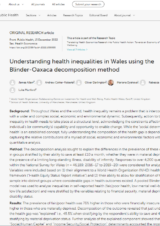
Throughout Wales and the world, health inequality remains a problem that is interconnected with a wider and complex social, economic and environmental dynamic. Subsequently, action to tackle inequality in health needs to take place at a structural level, acknowledging the constraints affecting an individual’s (or community’s) capability and opportunity to enable change. While the ‘social determinants of health’ is an established concept, fully understanding the composition of the health gap is dependent on capturing the relative contributions of a myriad of social, economic and environmental factors within a quantitative analysis. The decomposition analysis sought to explain the differences in the prevalence of these outcomes in groups stratified by their ability to save at least £10 a month, whether they were in material deprivation, and the presence of a limiting long-standing illness, disability of infirmity. The analysis not only quantified the significant health gaps that existed in the years leading up to the COVID-19 pandemic, but it has also shown what determinants of health were most influential. Understanding the factors most closely associated with disparities in health is key in identifying policy levers to reduce health inequalities and improve the health and well-being across populations.
